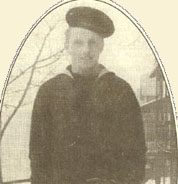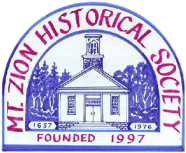Remembering
Joseph Paul Olewnik (1923-1945)
US Navy, WWII, MIA

Remembering - Joseph Paul Olewnik by Evo G. Facchine
Of the ten men portrayed in this series of articles, Joseph Paul Olewnik, son of Stanley Olewnik and Mary Visneski Olewnik, had the distinction, or as it turned out the misfortune, of having served in both the European and Pacific Theaters of Operation during World War II.
Joe or “Smokey” as he was affectionately known to his relatives and friends in the small community of Force, PA was born on February 6, 1923. He was one of twelve children, nine of which lived to adulthood, in the Olewnik family.
The nickname “Smokey” was probably derived from the fact that Joe, like his older brothers, fired the furnace for The Reverend Francis Ferrara, long time pastor of the St. Josephs Church, including the period of Joe’s teen years. I’m sure the old time residents near the Catholic church in Force can still see the smoke coming from the church chimney each morning as “Smokey” stoked the old coal furnace. Joe and his brothers also served as alter boys at the church. Valley folks will recall some other nicknames of the Olewnik boys, such as, Lampy, Punick, Tex and Potato, a sign of their popularity. Some how Theodore, the youngest brother and the source of most of this information escaped by just being called, Ted.
Joe was a member of the Civilian Conservation Corp (CCC) prior to obtaining a job in the local coal mines, a mine that was so busy, that he worked the night shift. In such an occupation it can be easily imagined that a young man would yearn for change. With his father’s reluctant consent, Joe enlisted in the United States Navy Reserve on October 19, 1942. He received his basic training at the Naval Station in Bainbridge, Maryland and finished his training in Cuba. It was while he was in Cuba he attained the rating of Coxswain, the designation of the person who usually steers and is in charge of a small boat and its crew.
Following a seven day furlough at home he was assigned to overseas duty in the European Theater of Operations. Records of his service during this twenty month tour of duty are not readily available. It is believed he served on a PT Boat and possibly participated in the Normandy invasion. This is all conjecture, but what is fact is that somehow during this tour of duty a boat was lost causing Joe and some of his crew mates to spend some twelve hours in the water before being rescued. That incident earned him a 30 day recuperation leave at home after which he was assigned to the Amphibious Training Center, Little Creek, Va. Upon completion of this training he was assigned duty in the Pacific Area.
In his new assignment the exact designation of his assigned ship was the U.S.S. LSM (R) 188. LSM standing for Landing Ship Mechanical. R meaning it was equipped with rockets. Their job was to bring ashore heavy equipment such as tanks and artillery during an invasion. It was just after such a mission had been completed in the landings at Okinawa after which the ship was patrolling off the small island of Zamini Shima, in the waters of the North Pacific, that disaster struck the U.S.S. LSM (R) 188. The ship was the victim of the last ditch effort begun by the Japanese to win the war when they introduced the use of “Kamikazi” aircraft. Kamikazi translated into English means “The Divine Wind” the name given to the wind storm that saved Japan from a Mongul Invasion centuries before. The Japanese believed that the Kamikaze type attacks would, like ‘The Divine Wind”, again save their homeland.
Joe, during the Kamikazi attack on his ship, is said to have manned a gun abandoned by another shipmate during the attack. The plane crashed into his ship causing internal explosions and in the blast Joe and four other shipmates were blown overboard and presumed to have drowned when a search for them proved unsuccessful. Despite the obvious, the Navy only declared them “Missing in Action”.
The date, March 29, 1945. The family was notified by a hand written message that was taken by phone at the Charles DeLullo Grocery Store. It read as follows; Deeply regret to inform you that your son, Joseph Paul Olewnik, Coxwain,U.S.N.R. is missing, following action, while in the service of his country. The Department appreciates your great anxiety, but details not now available, and delay in receipt thereof must necessarily be expected, to prevent possible aid to our enemy please do not divulge the name of his ship or station. Signed Vice Admiral Randolf Jacobs. No evidence of an official telegram exists.
Faith and prayers carried the Olewnik family through a long dreadful year of suspense. Joe’s mother, as did all the family, found it difficult to believe that Joe was dead. His father bemoaned the fact that he had signed those papers allowing Joe to join the Navy. His mother’s thoughts ranged from believing that he may be stranded alone in some far off island to believing that one day the bus would stop in Force and Joe would arrive, alive and well. Their deep Catholic faith and there close relationship with the Reverend Francis Ferrara played a large roll in aiding them through the long wait.
Then by letter dated, 4 April 1946, The Secretary of Navy writes that in view of the length of time that has elapsed since Joe was reported as missing, that the Navy is reluctantly forced to the conclusion that he is deceased. In compliance with Section 5 of Public Law 490, 77th Congress, As Amended, the death of your son is, for the purposes of termination of pay and allowances, settlement of accounts and payment of death gratuities, presumed to have occurred on 30 March, 1946, which is the day following the expiration of twelve months in the missing status.
Of course, Joe’s body was never recovered for burial, but a stone maker marks the place where he would have been buried beside his mother and father in the Saint Joseph's Catholic Cemetery in Force. His name can also be found on the Memorial Monument at Pearl Harbor.
The following final words, so hard to accept, were the final paragraph of the above mentioned letter of April 4th: I know what little solace the formal written word can be to help meet the burden of your loss, but in spite of that knowledge, I cannot refrain from saying very simply, that I am sorry. It is hoped that you might find comfort in the thought that your son gave his life for his country, upholding the highest tradition of the United States Navy.
Sincerely Yours,
James Forrestal
The Secretary of the Navy
Lest We Forget…
